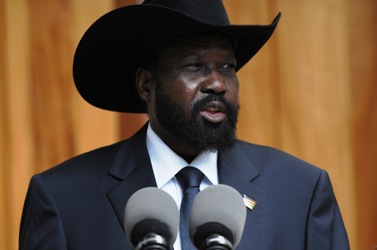Kiir accuses Sudan of backing armed militias destabilising S. Sudan
By Julius N. Uma
April 01, 2012 (JUBA) — South Sudan’s President on Friday told members of the ruling party’s National Liberation Council (NLC) how Khartoum has allegedly created and sponsored armed militias with intentions to destabilise the newly independent nation.

Khartoum announced that the summit was off demanding that Juba stop backing Sudanese rebel groups along the shared border. Juba denies backing the rebels and has said it is yet to receive official confirmation that Sudanese President Omar al-Bashir will not visit Juba.
The United Nations, African Union and diplomats are urging Bashir and Kiir to hold the meeting a neutral venue. Negotiators from both sides have travelled to Addis Abba to renew talks on security issues.
Kiir said on Friday that Bashir’s government was the “biggest” challenge South Sudan faced in addressing its own internal security.
“They [Sudan] have created, sponsored and armed militias that continuously disturb our border states. They have bombed civilian targets in South Sudan”, said Kiir who is the Chairman of the ruling SPLM and the head of the SPLA – South Sudan’s army.
The president instructed governors of South Sudan’s five states bordering the country’s northern neighbour Sudan to mobilise the public to defend the nation if it attacked. The included the states of Unity, Upper Nile, Warrap, Northern and Western Bahr el Ghazal.
This comes after Sudan announced a nationwide recruitment drive for its paramilitary group the Popular Defence Forces (PDF) in March.
OIL DISPUTE
He repeated South Sudan’s complaint that Sudan had confiscated southern crude on its way to be exported through the Red Sea. Since independence in July last year the two sides have been unable to strike a deal on oil fees. Landlocked South Sudan currently has no option but to export its oil through Port Sudan.
Since South Sudan stopped its oil production in January in protest at Sudan’s actions, world’s youngest and severely underdeveloped nation Kiir assured the delegates that although the country faces hard economic times as a result of the ; his government will continue to foster an environment of unity, equality and progress, which he described as the “emblem” of the
south-ruling party.
“We must conclude all of the outstanding CPA [Comprehensive Peace
Agreement] negotiations in order for us to focus our concentration on
developing the nation,” he asserted.
Kiir also appreciated efforts made by the Thabo-Mbeki-led African Union High Level Implementation Panel on Sudan (AUHIP), which he said paved way for the recent progress made on the series of post-independence negotiations between Sudan and South Sudan.
The president specifically cited the break through on the issue of citizenship and nationality, which were due to be finalized during Juba summit. He however expressed regret on issues of Abyei, which has not gained any momentum since the country’s independence in July 2011.
On the oil shutdown, Kiir said he had invited his Sudanese counterpart; Omar Hassan al-Bashir in an effort to end the current impasse and move the negotiations forward.
“I have invited President Bashir to a summit in Juba. President Bashir has accepted my invitation and we look forward to welcoming him to Juba on April 3rd. I hope the upcoming summit will President Bashir will enable us to sign the agreements that were initiated by our negotiating teams,” Kiir remarked.
The South Sudan leader, in a show of solidarity, urged members of the party to fully support the forthcoming summit and work with the country’s negotiating team to enable the two countries broker a “reasonable” agreement. In recent days, however, the ruling party seemed divided on the visit of the Sudanese leader, who is wanted by the International Criminal Court (ICC).
FOOD INSECURITY
Describing food security as being important as physical security, President Kiir said the national government has embarked on a robust strategy to import food and essential commodities to ensure the anticipated disaster is abated.
At least 4.7 million South Sudanese, according to a recent food security assessment remain at risk of food insecurity. The study, conducted by the UN Food and Agricultural Organization (FAO) and World Food Programme (WFP) also said about 1 million people could face severe food shortages across the world’s newest nation.
(ST)
